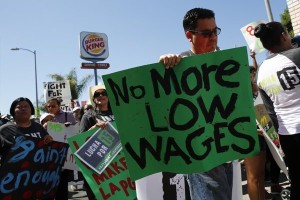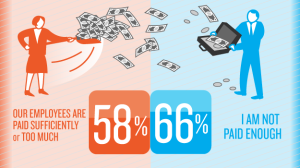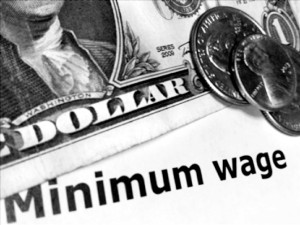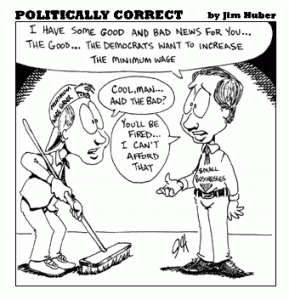$6 Dollar Standoff
As a 20 year old college student I’ve just started my journey into the working world. On top of being a student, I work part time in the music industry. Like most industries, you start at the very bottom and that comes with a cents on the dollar paycheck known as minimum wage. My own minimum wage paychecks, however, weren’t my first experience with the low dollar amount. Growing up I watched my father start a company that employed many minimum wage workers. Coming from a upper class family, I have never had to put a value to my time, and money has never been something that was a daily worry. While I was living comfortably though, many people that worked for my family’s business were living pay check to pay check. Starting my first job made me look at that business from a different perspective. My job made me ask, was I only worth $9? This new evaluation of myself made me take a second look at what minimum wage meant and the difficulties it presents.
This debate is very relevant to me, as the minimum wage increase has both positive and negative effects on my life. On one side, my check could definitely use the boost as just the commute to work itself eats up a third of the money. If I needed to solely live off my pay check it would be nearly impossible, especially in LA. On the other side, however, business owners like my father see the minimum wage increase as a threat to their company. With the city of Los Angeles looking to increase the wage to $15 it’s not just a dollar here and there, but a substantial new cost a company must undertake. With a personal interest in myself, and a deep interest in the success of my family business, this issue has become one to make me think deeper into why the minimum wage exists.

The most obvious claim is that we must value our workers more than the national average wage of $7.25. Many recent strikes have workers demanding wages that support their families, something more than a “starvation wage.” I can resonate with their frustration and the disappointment when opening the checks in the mail. If I was in a minimum wage situation indefinitely and it was my only source of income, I would need more money, but there is a lot more to this issue.
In small businesses that employ minimum wage workers, the wage allows them to be successful through competitive prices for their customers. Raising that wage by $6 more means huge new costs that must be shifted somewhere. I discussed this issue with my father who blatantly put it, there’s only two places for the new costs to come from, raise prices or cut jobs. In this situation companies will be forced to raise prices by potentially 50% to 60% just to compensate. The other option, firing workers, from my father’s perspective means the first to go will be those with the fewest skills, the current workers at or near minimum wage. Wages are set by supply and demand for labor. Using a minimum wage artificially influences that balance. So now you will have minimum wage workers making more money, but they have to spend more to live because they purchase goods and services from places that use minimum wage labor. The LA Times put the numbers into perspective “overall unemployment at the height of the Depression was about 25%. Especially for low-skill workers and for young workers, the two groups of workers who will be disproportionately hit by a minimum-wage increase, ours is a labor market in crisis.” The minimum wage is a struggle for business across the board as low production costs are top priority, and affordable labor is a necessity for operations.
The minimum wage increase doesn’t just effect the bottom line workers pay in a company it also affects company moral. As a minimum wage worker I do feel less valued than other employees because I make the least amount possible. While many people think raising the minimum wage would help workers feel more valued, it in fact has the opposite effect. There is a negative psychological effect with raising the minimum wage. When people earn raises and their pay goes up from the minimum wage, they feel good that they are now more valued. I myself would love to be able to say that I make more than base pay. When the wage goes up and workers are again making just minimum wage then they aren’t happy, and they want even more. Why should someone that has taken 10 years to earn $15 now be happy that someone brand new to the company at an entry level will make just as much as them. They will want a $6/ hr raise too. So the domino effect happens and it destroys companies and workers moral. Raising the minimum wage affects salaried managers as well. To be salary you must make at least double the minimum wage, so when the minimum goes up not all managers are making enough and now they are reclassified as hourly workers. This lowers their moral as they are no longer in this higher category of management. This just happened at our family business when the minimum wage increased from $8 to $9 as a lot of the front line managers were making $16 to $17.

This debate certainly isn’t easily answered as it is a complex issue with two very different sides. The minimum wage increase is a perfect case of putting oneself in the others shoes, it is a debate with each side having very little experience with the others circumstances. This lack of understanding is what has created a standoff in Los Angeles over $6. My unique situation has allowed me to gain some insight into the differing perspectives and see why each side is willing to battle so hard.


Leave a Reply
You must be logged in to post a comment.